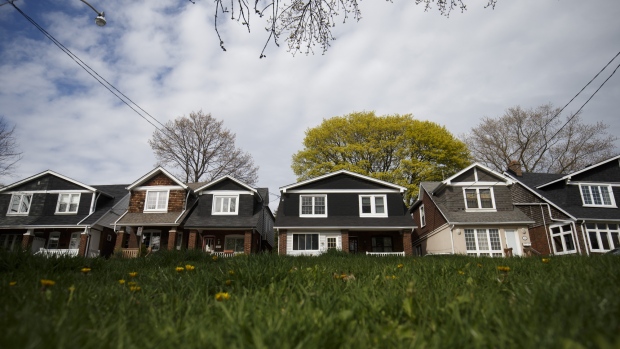
US GDP Report Set to Highlight Immigration-Driven Economic Boom
Initial data on US gross domestic product for the first quarter of 2024 is set to confirm an ongoing economic boom amid a tailwind from surging immigration.
Latest Videos
The information you requested is not available at this time, please check back again soon.

Initial data on US gross domestic product for the first quarter of 2024 is set to confirm an ongoing economic boom amid a tailwind from surging immigration.

A South Florida office skyscraper from Related Cos. landed new finance tenants, including a John Paulson business and a private equity firm that counts Mark Bezos as a founding partner.

Oracle Corp. is moving its headquarters out of the city. Tesla Inc. is pulling back after a rapid expansion. Almost a quarter of commercial office space is vacant, and nowhere in the country have residential real estate prices fallen further from their pandemic peak.
Mortgage rates in the US increased for a fourth straight week.

It’s independents, a growing voting bloc, who drive election victories in the swing state, where the GOP is rushing to defuse abortion as an issue.
Feb 8, 2019
, BNN Bloomberg

Thirty-two-year-old Daniel Himmel is happy with his current living situation despite not having what many young Canadians dream of achieving: Home ownership.
The Toronto-based artificial intelligence software manager has been renting most of his adult life, and while owning a home might be a goal for him someday, he says it’s not a priority – or financially viable – at this point in time.
"For me, my ideal scenario would be to own a free-standing home [close to] public transportation to work, which is [in] downtown Toronto," he said in a telephone interview with BNN Bloomberg. “It’s just not feasible.”
With consumer debt levels on the rise and interest rates expected to move higher this year, young Canadians like Himmel are weighing whether going house broke to own property is a good idea for their finances in the long run.
"Right now it's just not that much of a debate because it's not even an option," Himmel said. "If it was, I'd have to really consider how badly I'd want the comfort and security of owning a home."
Himmel, who shares the cost of a $2,550-per-month two-bedroom unit with his partner in Toronto's Annex neighbourhood, said he can’t afford a down payment without financial help. That's despite having a stable job and a savings strategy, which includes frequently putting money into a tax-free savings account and registered retirement savings plan, among other investment vehicles.
Personal finance expert and Chartered Professional Accountant Robin Taub said that when considering whether to rent or buy, young people should be aware of the added costs of home ownership beyond mortgage payments, such as property taxes and repairs.
"You don't really want to get into a situation where you're so tight that one little thing, one emergency, one unexpected expense can cause you to miss your mortgage payment," she said in a telephone interview. "I think people really do stretch themselves because it has gotten so expensive."
Himmel added that while moving out of the city into a suburban neighbourhood would make home ownership more realistic, living close to work and getting to experience the city on a daily basis isn’t something he’s willing to give up right now.
"I'm not married, I don't have kids. I really enjoy the city, the social availabilities," he said. "That stuff is really important to me to experience at this age."
For Himmel, the long-term financial gain that could come with sinking his money into a home right now isn't appealing, but he said his views might change under different life circumstances – like having children.
"Sure, I can have a home and maybe it will appreciate in value, and maybe long term that might be the right option for me," he said. "But the idea of forfeiting my life – being in a place where I feel like my day-to-day Iife is enriched – to say that 50 years down the road I will be more secure financially, that's not a compelling argument for our generation, I don't think. For our parents it was."
Making home ownership more affordable
While not everyone sees the benefit of home ownership in the current market environment, Finance Minister Bill Morneau said last month the federal government is looking at ways to make buying a home more affordable for millennials. He didn’t offer up any specifics, but experts have weighed in on some possible solutions.
Francis Fong, chief economist with CPA Canada, said one course of action the government could take is creating incentives for young people to save, similar to what the U.K. government implemented with its Help to Buy Plan, which pays savers a government bonus each time they tuck £200 away for their first home.
“Other ways governments traditionally try to make it easier is through measures that make it easier for borrowers to get into debt – that’s a less positive way of doing it,” Fong said in a telephone interview. “You don’t want to implement a measure that triggers deterioration in credit quality.”
Taub adds that changing zoning rules to get more homes built is something the government can control. “It’s really a supply and demand issue,” Taub said.
But ultimately, both Taub and Fong said the financial decision to own a home comes down to individual situations and goals.
“I think it would be important for someone looking at the housing market today to do a very conservative, realistic assessment of whether or not what they’re trying to get to is affordable over the long term,” Fong said.
“If you can’t afford your home, then it’s definitely not a good financial decision to get in over [your] head. Categorically, it is never a good idea to put yourself in a financially-risky position just for the purpose of home ownership.”